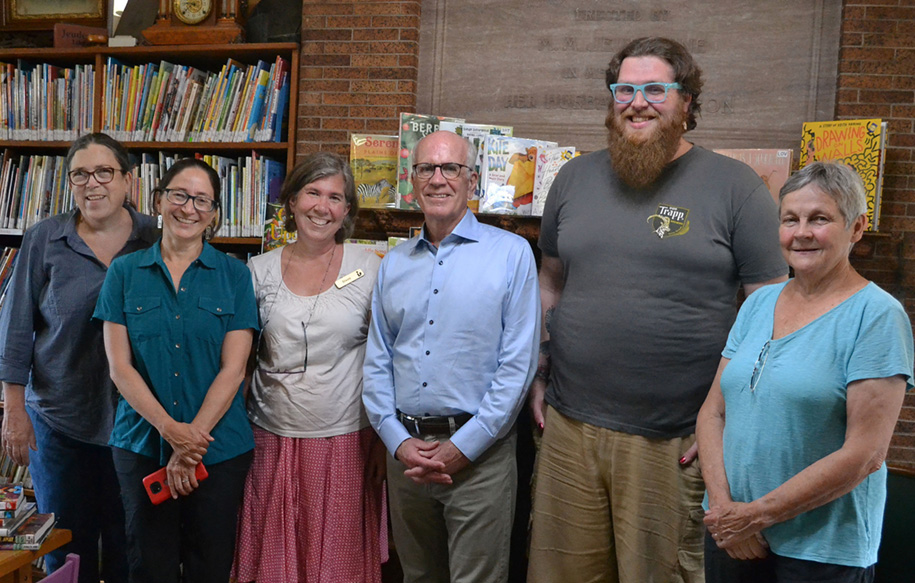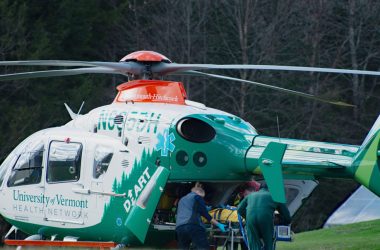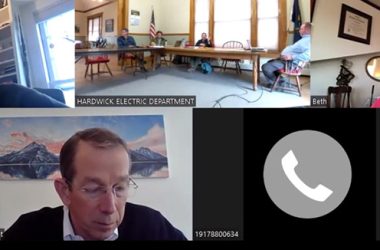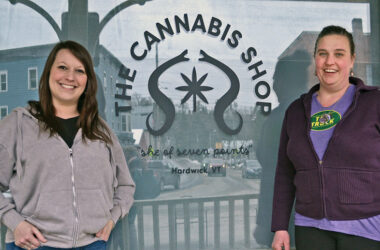
Members of the Jeudevine Memorial Library board of trustees (from left) Daphne Kalmar, Board Chair Jodi Lew-Smith, Library Director Diane Grenkow, Milo Tandy and Andrea Brightenbach welcomed Senator Peter Welch (fourth from left) June 26 when he visited the library to congratulate them on their hard work on the expansion project. In fiscal year 2022 Senator Patrick Leahy secured $600,000 in USDA funding for the expansion project. As his successor, Sen. Welch is following up on the project.
by Francesca Kitch
GREENSBORO — On Monday, approximately 100 people from the near and far corners of Vermont traveled to see Senator Peter Welch visit the Northeast Kingdom at the Hill Farmstead Brewery in Greensboro Bend.
The purpose of his visit was to host a listening session to understand how he – and Congress – can better support rural communities. Sen. Welch said that he is interested in doing “everything I can to revitalize rural America.”
Attendees were eager to learn and share their own experiences, as well as soak up the atmosphere of a community coming together. “It was neat to see how many different types of people came out. Some people really came from far afield,” said Greensboro resident Naomie Ranz-Schleifer.
Senator Welch was joined by a panel of local leaders, business owners, and champions, including Representative Katherine Sims, Andy Kehler of Jasper Hill Farm, Jon Ramsay of the Center for an Agricultural Economy, Sarah Waring of the USDA Rural Development office, Jessica Savage of the Vermont Council on Rural Development, and Shaun Hill of Hill Farmstead Brewery. Each spoke briefly about their recent efforts to support the communities of the Northeast Kingdom, and outlined how they will work with Congress in the future.

Senator Peter Welch answers a question from the audience during his June 26 visit to the Hill Farmstead Brewery in Greensboro.
Andy Kehler spoke about the cost barrier between medium- and large-scale industry and how gaining support in rural areas can allow for independent businesses to thrive. He added that over half of every dollar spent by Jasper Hill Farm is spent within a 15-mile radius, summing to about 250 million dollars invested within the Northeast Kingdom.
Jon Ramsay mentioned the importance of advocating for efficiencies in the process of rural agricultural communities throughout the state, and Sarah Waring emphasized the themes of interdependence and complexity in rural areas in the context of their fragile economies. She drew the bottom line that locals have to recognize that federal and state agencies “should not feel anonymous,” and that they are here to help people like them.
To this point, Representative Sims discussed the recent 3-million-dollar federal investment to increase human capacity to know what grants are available to locals – an example of directly using federal dollars to invest in people and their impact on their own communities.
Waring’s “three-legged stool” of rural economic development drove this point home. These legs included connections to federal and state leaders who have the decision-making power to make money move downstream; local leaders who help to bring money to the community or volunteer, bringing value to the communities; and the federal and state agencies that can implement those federal dollars, putting them in the hands of those leaders.

Senator Welch chats with Katherine Sims, State Representative (Orleans 4), at the June 26 gathering in Greensboro at Hill Farmstead Brewery.
At this point, anyone in the crowd was given the opportunity to come forward and raise a concern or question they had for the panel. Residents mentioned their concern for how “Vermont feeds itself,” organic food, care for the elderly, and accessibility of affordable options for sustainable energy.
“My job is to work with other people as much as I can,” said Welch. He noted that the key to this is igniting conversations with different politically-affiliated residents in ways that ask how they are dealing with certain issues universal to rural communities, rather than how they voted in the last election.
“You build some trust because you have concern for what’s happening with the community” rather than talking about “things we disagreed on.”
Overall, the event was well received, and after the question-and-answer session was over, the mingling began. Ranz-Schleifer admitted that she wished that “there had been a little bit more time for question and answer, because we all learn a lot about the state level or regional level programs that exist that we don’t necessarily know are happening” but that it was “nice to see that Peter and the others are responding to [our feedback] because this is how the work gets done.”
Her thoughts were echoed by Shaun Hill, who was asked how he felt about hosting an event like this. “It’s humbling and wonderful to have such a profound turnout” and it truly serves “as a reminder that people are hungry for connection, and that people really care about community.”
“[Senator Welch] is authentic,” Kehler added, and is really working “to make our lives a little better here in the Northeast Kingdom.”







